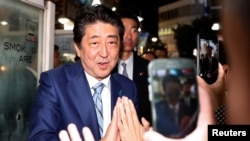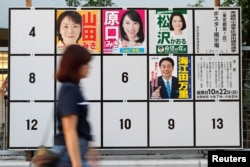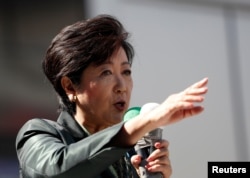Japanese Prime Minster Shinzo Abe's conservative coalition is increasingly confident it will win a decisive victory in Sunday's early election, and hold on to its current two-thirds majority in parliament.
Seeking to take advantage of rising public support for his hardline stance against the North Korean nuclear threat, Abe recently dissolved the lower house of parliament to call for a "snap" election this month, rather than wait for the legislative term to end in December, 2018.
If Abe's Liberal Democratic Party (LDP) can maintain its majority in the Japanese legislative body known as the Diet, he could serve as prime minister until 2021. The LDP and its ruling coalition partner, the Komeito Party, currently hold 325 of the 475 seats in the lower house.
Strong defense
The latest surveys indicate the LDP could win between 280 and 300 seats, which, combined with the Komeito's expected 35 seats, could ensure Abe his super majority.
Just a few months ago Abe's approval rating dropped to near 30 percent due to domestic scandals alleging he used his office to help friends and family profit, charges that he denies.
But in the face of North Korea's continued threatening behavior, recently firing two intermediate range missiles over Japanese airspace and threatening to "sink" Japan into the sea, the Japanese public has increasingly coalesced in favor of the conservative prime minister's strong defensive posture.
"Any prospects for what you would call the "Japanese left" getting any power any time soon, that is gone," said security analyst Grant Newsham, with the Forum for Strategic Studies in Tokyo.
The Abe administration has advocated bolstering Japan's missile strike capability, and has closely aligned with U.S. President Donald Trump's maximum pressure policy to use crippling sanctions and the threat of military action to force the Kim Jong Un government to give up its nuclear program.
The prime minister has also led a controversial effort to loosen constraints imposed on the Japanese military by the country's post World War II pacifist constitution.
Party of hope
The emergence of a new conservative party, called Kibo no To (Party of Hope), was initially seen as a strong challenger to Abe. But it has not gained significantly in the polls.
Led by popular Tokyo Governor Yuriko Koike, a former minister of defense, the Party of Hope drew in conservative leaning members of the now defunct Democratic Party of Japan.The liberal wing of the party split off to form the Constitutional Democratic Party.
Analysts say the Party of Hope's prospects were hurt by Koike's decision not to run in the election as it left the party without a known alternative for prime minister. Koike said she would remain as governor to focus on preparations for the 2020 Olympics in Tokyo.
Her party's polices, which are strong on defense yet liberal leaning on the economy, also seemed to alienate a significant number of both conservatives and progressives.
"That leaves me to question whether the whole party has a consistent philosophy," said Yu Uchiyama, a Japanese politics professor at the University of Tokyo.
Constitutional amendment
If the Party of Hope splits the traditional opposition vote without siphoning off a significant number of LDP votes, the election result could strengthen Abe's position on national defense. But it is unclear whether he will garner the support needed to change the constitution that prohibits Japan from going to war to settle international disputes.
The Japanese public remains divided over Abe's proposal to allow the military more latitude to counter potential threats from countries like North Korea and China, and to support allies like the United States.
President Trump's threatening rhetoric to totally destroy North Korea if attacked has heightened concerns for Abe opponents, who argue that loosening restrictions on the use of force will entangle Japan in U.S.-led conflicts.
The Party of Hope, as well as Abe's coalition partner the Komeito Party, have been ambiguous on this issue, voicing support for a more assertive military, but reluctant to support altering the constitution.
Sunday's election will also be a referendum on Abe's conservative economic policies, which have boosted corporate profits but have not significantly increased the income of ordinary Japanese.
Abe's support for the nuclear energy industry following the Fukushima disaster in 2011 could also be a key election issue. Koike's Party of Hope wants to phase out nuclear power in Japan by 2030, but for now it supports restarting offline nuclear power plants.
A late season typhoon is expected to hit southern Japan on Sunday with heavy rains and destructive winds, which is forcing officials in Okinawa to stage voting a day early on some remote islands and could reduce voter turnout in other areas.







